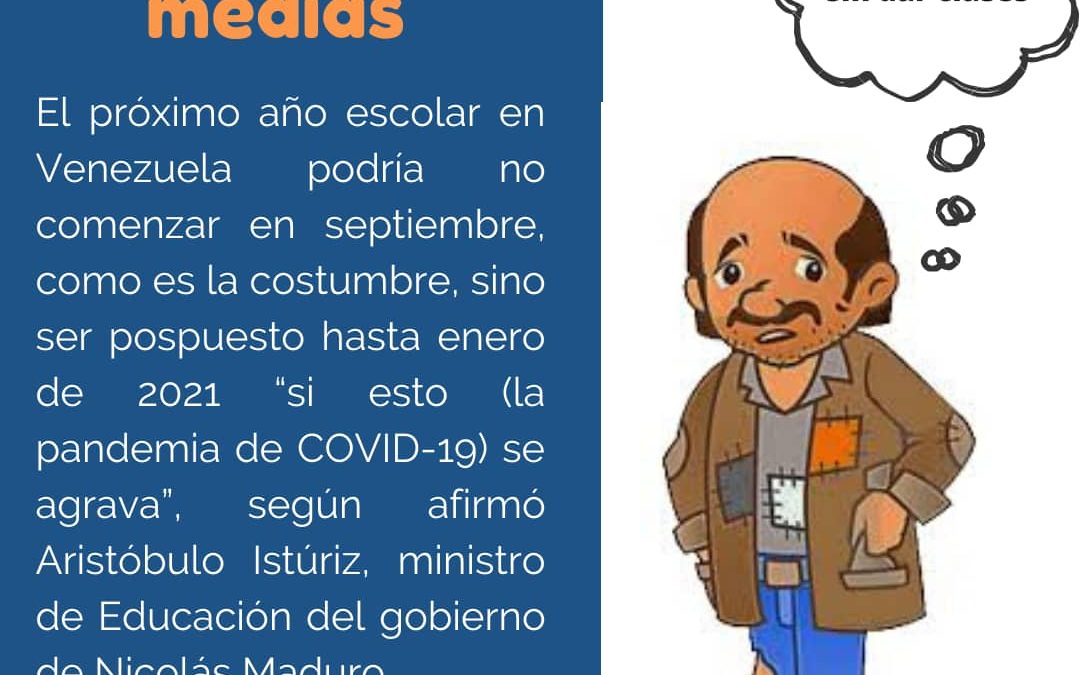In January, 2020, the government of Nicolás Maduro announced that resources had been approved for 100 new schools and claimed that school enrollment had increased by 6%, and that the education system had 10 million active students. However, teachers and institutions that monitor school development report higher absenteeism, while at least 100,000 teachers have quit or abandoned their posts and enrollment in the various levels of education has actually declined.
Since the start of the year, the sector’s professionals have been protesting in different parts of the country due to the poor wages they perceive and the deplorable conditions of schools. In fact, over 40% of teaches have left the country because their wages are insufficient to sustain their families.
Deteriorated classrooms without students
The levels of absenteeism and abandonment are such that, in some areas of the country, enrollment doesn’t even cover 20% of the school-age population. The Democratic Unit of the Education Sector said that school exclusion in Venezuela had reached 50% by 2019.
Some of the main issues affecting school attendance are:
– Lack of food in homes and serious problems in the food program for schools (FPS) for feeding children and adolescents.
– Lack of tools for education (notebooks, pencils, books), appropriate clothing to attend school and even poor footwear.
– Failing basic services, lack of public transport and fuel, or problems to find the cash needed to pay for the fares.
– Children and adolescents stop attending classes because they must work to help sustain their families.
Public and private schools have been robbed and vandalized in Aragua, Vargas, Trujillo and the Capital District. In many of these incidents, the schools are left unable to continue operating and lack the necessary resources to make repairs or acquire the equipment or supplies stolen or damaged.
Public and private centers for special education haven’t escaped this hard reality and struggle to keep operating with a deficit of 60% in staff, low wages for teachers and serious supply and infrastructure issues, despite the promise of 100% in attention stated by the Plan for the Country 2019-2025.

Virtual learning?
On Marh 13th, after announcing the first two cases of COVID-19 in Venezuela, Maduro decreed the suspension of live classes “until further notice” at all levels of education, in order to prevent the spread of the coronavirus in classrooms. This measure took school boards and teachers by surprise, and they had to define a hasty contingency strategy to comply with the order without losing the continuity of school assignments.
Although teachers were requested to follow their usual timetables until 3:00 p.m., aiming to keep food programs working, many schools didn’t even have a functioning program anymore, nor did they have the materials or the electricity and water to attend students. Additionally, they couldn’t guarantee enough safety to prevent the spread of the disease.
Although civil society asked the Education Ministry to review the expectations of fulfilling the current school year realistically and in accordance with the national and global context, the national body decided to keep the school schedule with a Virtual Learning program they called “Each Family A School,” which was severely questioned by specialists and teachers, and even parents and caretakers, who said they didn’t have the training or the tools to take on teaching responsibilities. Also, they denounced that the virtual learning program was improvised, that it lacked pedagogical criteria and was unviable in a country where 80% of students don’t have access to personal computers, nor TV sets or smart phones. 6.5 million children and adolescents (56% of students in elementary school and high school) don’t have access to phones or internet and those who do, must deal with constant problems with the quality or power outages.
But not all is lost
Despite the lack of resources, the precarious conditions and many other factors that diminish the capacities of education institutions; even amidst the humanitarian emergency we’re going through, exacerbated by COVID-19, there are important initiatives for defending the rights of all children and adolescents to quality, inclusive education. Several gubernatorial authorities have offered proposals to attend the COVID emergency in the context of education. The federations of private schools urge their associates not to increase the monthly tuition. AVEC’s education centers forge strategies to continue teaching children without internet access and Fe y Alegría offers lessons over WhatsApp and radio. Salesian communities specifically take care of education needs in indigenous and rural areas. The FPS, with the motto “Under quarantine we’re all FPS”, has attended 332,519 students in 18 municipalities of Aragua state.
There are many reasons to hold out hope if we actively defend and protect the right for education and development of children and adolescents in Venezuela.
Reportaje elaborado por la Red de derechos Humanos de Niñas, Niños y Adolescentes
Edición y producción a cargo de Caleidoscopio Humano
Gracias al apoyo de Tejiendo Redes de infancia, con el apoyo de la Unión Europea para América Latina




Comentarios recientes